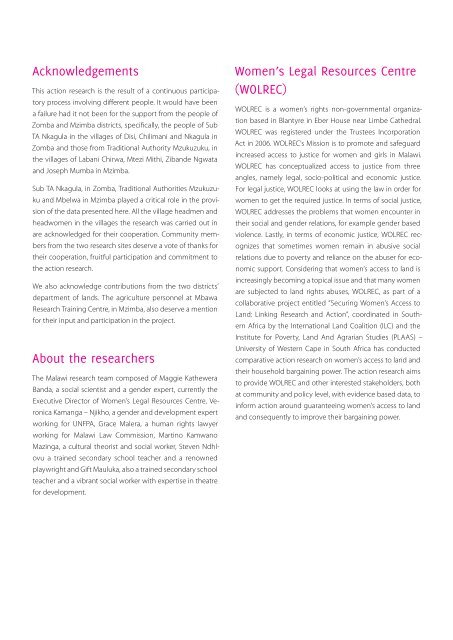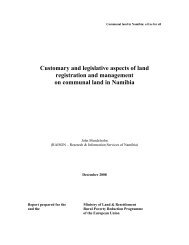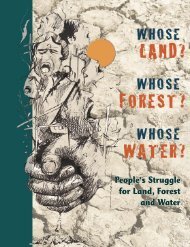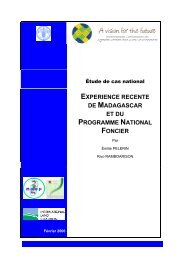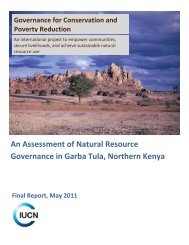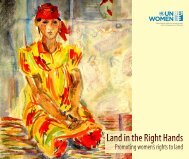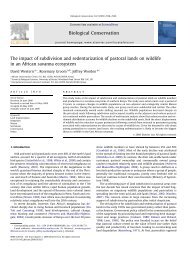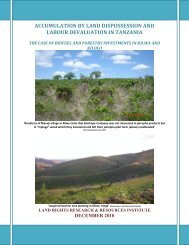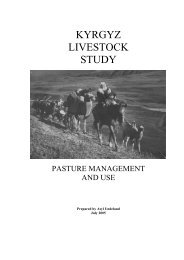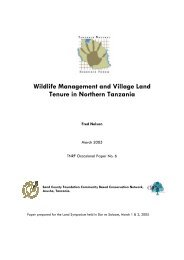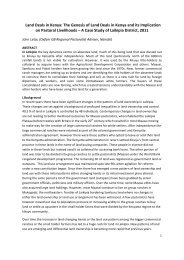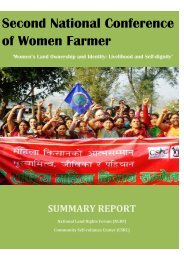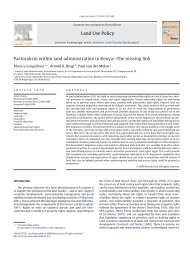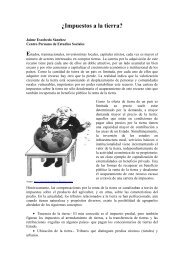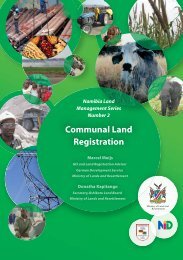Women's access to land and household bargaining power
Women's access to land and household bargaining power
Women's access to land and household bargaining power
You also want an ePaper? Increase the reach of your titles
YUMPU automatically turns print PDFs into web optimized ePapers that Google loves.
Acknowledgements<br />
This action research is the result of a continuous participa-<br />
<strong>to</strong>ry process involving different people. It would have been<br />
a failure had it not been for the support from the people of<br />
Zomba <strong>and</strong> Mzimba districts, specifically, the people of Sub<br />
TA Nkagula in the villages of Disi, Chilimani <strong>and</strong> Nkagula in<br />
Zomba <strong>and</strong> those from Traditional Authority Mzukuzuku, in<br />
the villages of Labani Chirwa, Mtezi Mithi, Zib<strong>and</strong>e Ngwata<br />
<strong>and</strong> Joseph Mumba in Mzimba.<br />
Sub TA Nkagula, in Zomba, Traditional Authorities Mzukuzu-<br />
ku <strong>and</strong> Mbelwa in Mzimba played a critical role in the provi-<br />
sion of the data presented here. All the village headmen <strong>and</strong><br />
headwomen in the villages the research was carried out in<br />
are acknowledged for their cooperation. Community mem-<br />
bers from the two research sites deserve a vote of thanks for<br />
their cooperation, fruitful participation <strong>and</strong> commitment <strong>to</strong><br />
the action research.<br />
We also acknowledge contributions from the two districts’<br />
department of <strong>l<strong>and</strong></strong>s. The agriculture personnel at Mbawa<br />
Research Training Centre, in Mzimba, also deserve a mention<br />
for their input <strong>and</strong> participation in the project.<br />
About the researchers<br />
The Malawi research team composed of Maggie Kathewera<br />
B<strong>and</strong>a, a social scientist <strong>and</strong> a gender expert, currently the<br />
Executive Direc<strong>to</strong>r of Women’s Legal Resources Centre, Veronica<br />
Kamanga – Njikho, a gender <strong>and</strong> development expert<br />
working for UNFPA, Grace Malera, a human rights lawyer<br />
working for Malawi Law Commission, Martino Kamwano<br />
Mazinga, a cultural theorist <strong>and</strong> social worker, Steven Ndhlovu<br />
a trained secondary school teacher <strong>and</strong> a renowned<br />
playwright <strong>and</strong> Gift Mauluka, also a trained secondary school<br />
teacher <strong>and</strong> a vibrant social worker with expertise in theatre<br />
for development.<br />
Women’s Legal Resources Centre<br />
(WOLREC)<br />
WOLREC is a women’s rights non-governmental organization<br />
based in Blantyre in Eber House near Limbe Cathedral.<br />
WOLREC was registered under the Trustees Incorporation<br />
Act in 2006. WOLREC’s Mission is <strong>to</strong> promote <strong>and</strong> safeguard<br />
increased <strong>access</strong> <strong>to</strong> justice for women <strong>and</strong> girls in Malawi.<br />
WOLREC has conceptualized <strong>access</strong> <strong>to</strong> justice from three<br />
angles, namely legal, socio-political <strong>and</strong> economic justice.<br />
For legal justice, WOLREC looks at using the law in order for<br />
women <strong>to</strong> get the required justice. In terms of social justice,<br />
WOLREC addresses the problems that women encounter in<br />
their social <strong>and</strong> gender relations, for example gender based<br />
violence. Lastly, in terms of economic justice, WOLREC recognizes<br />
that sometimes women remain in abusive social<br />
relations due <strong>to</strong> poverty <strong>and</strong> reliance on the abuser for economic<br />
support. Considering that women’s <strong>access</strong> <strong>to</strong> <strong>l<strong>and</strong></strong> is<br />
increasingly becoming a <strong>to</strong>pical issue <strong>and</strong> that many women<br />
are subjected <strong>to</strong> <strong>l<strong>and</strong></strong> rights abuses, WOLREC, as part of a<br />
collaborative project entitled “Securing Women’s Access <strong>to</strong><br />
L<strong>and</strong>: Linking Research <strong>and</strong> Action”, coordinated in Southern<br />
Africa by the International L<strong>and</strong> Coalition (ILC) <strong>and</strong> the<br />
Institute for Poverty, L<strong>and</strong> And Agrarian Studies (PLAAS) –<br />
University of Western Cape in South Africa has conducted<br />
comparative action research on women’s <strong>access</strong> <strong>to</strong> <strong>l<strong>and</strong></strong> <strong>and</strong><br />
their <strong>household</strong> <strong>bargaining</strong> <strong>power</strong>. The action research aims<br />
<strong>to</strong> provide WOLREC <strong>and</strong> other interested stakeholders, both<br />
at community <strong>and</strong> policy level, with evidence based data, <strong>to</strong><br />
inform action around guaranteeing women’s <strong>access</strong> <strong>to</strong> <strong>l<strong>and</strong></strong><br />
<strong>and</strong> consequently <strong>to</strong> improve their <strong>bargaining</strong> <strong>power</strong>.


